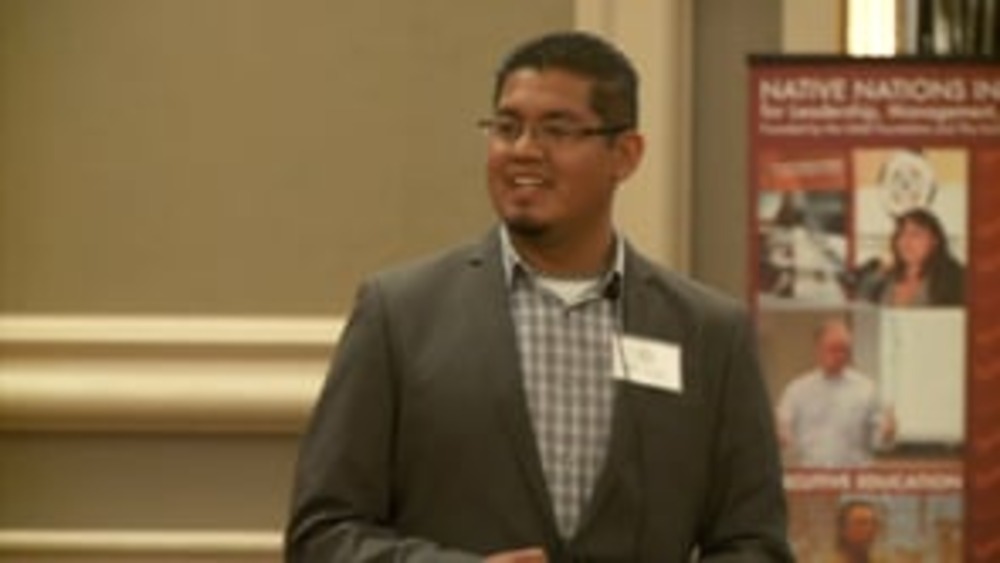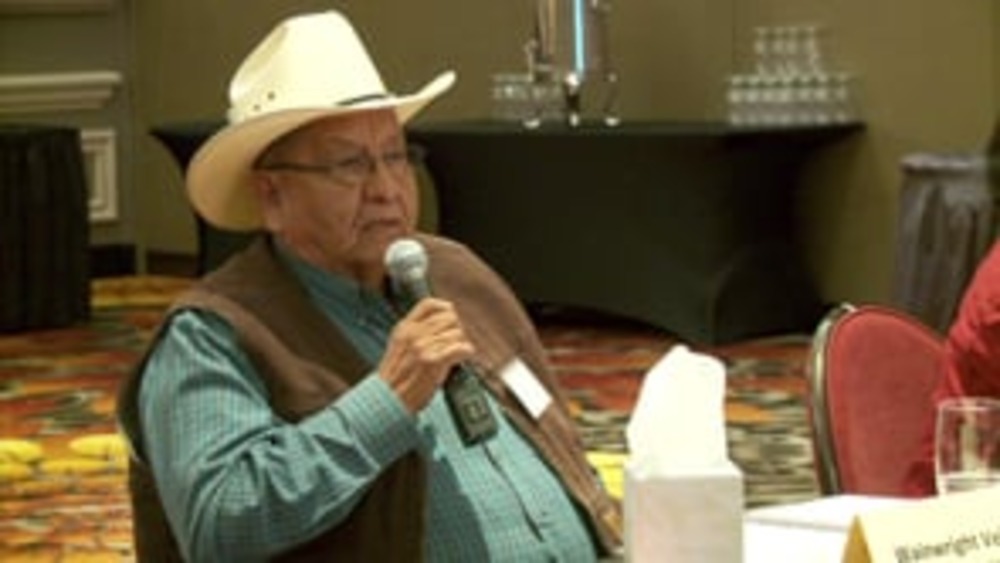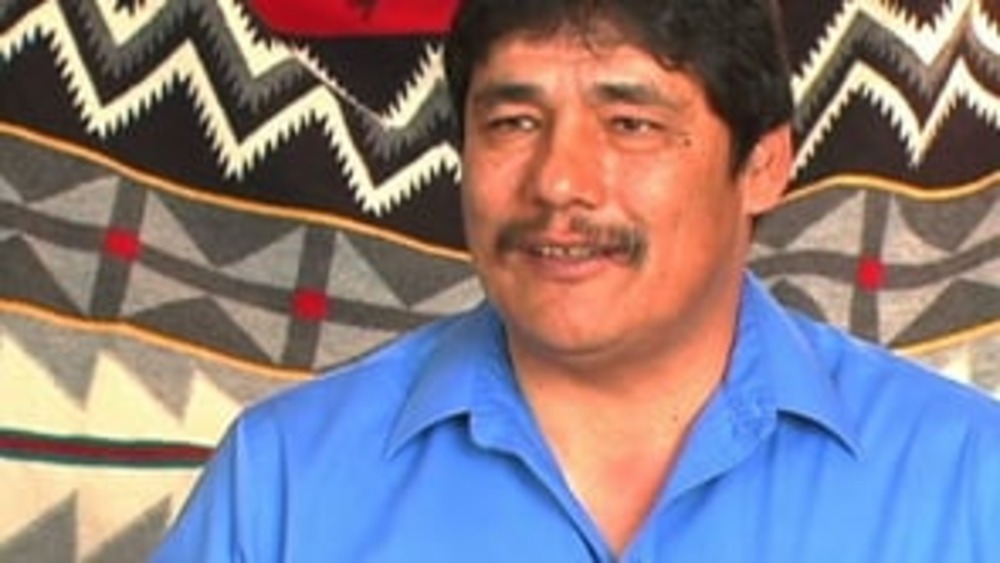Robert Hershey, Professor of Law and American Indian Studies at The University of Arizona, dispels some longstanding stereotypes about what the federal government can and will do should a Native nation decide to amend its constitution to remove the Secretary of Interior approval clause or else make their foundational governing document more culturally appropriate in ways that perhaps do not conform to federal bureaucrats' attitudes about how that Native nation should govern itself. He also offers a broad definition of constitutions that encompasses things like Indigenous ceremonies, songs, the knowledge of elders, etc.
Additional Information
Hershey, Robert. "Dispelling Stereotypes about the Federal Government's Role in Native Nation Constitutional Reform." Tribal Constitutions Seminar. Native Nations Institute for Leadership, Management, and Policy, University of Arizona. Tucson, Arizona. April 3, 2014. Presentation.
Transcript
Robert Hershey:
“Good afternoon everyone and thanks for staying awake after that fabulous meal. I usually have my students interact with me, but Terry [Janis] said something about being older and I want to just get this out of the way. May I ask you what color your hair is?”
Audience member:
“It’s calico.”
Robert Hershey:
“Okay. I wasn’t anticipating that. I like that one. There was a young man over there, I’m looking for people with the same hair color. Calico, I’d never heard that. Robert, what color is your hair?”
Audience member:
[Inaudible]
Robert Hershey:
“All right. My hair color is moonstruck, just so you know that. It’s not silver, it’s not gray, it’s not old. You’re getting a little moonstruck yourself. So let’s talk about that.
The other thing I want to talk about is gravity because I always like to remember, someone was talking about starting the beginning of the day with a prayer. I always like to remember that if it wasn’t for gravity, I would float away and oftentimes I do float away. So I’m pretty attuned to the idea that I like gravity. If you all want to stand up and jump and wake yourself up and feel gravity, you can. No takers?
The other thing that I want to tell you about is that in addition, I’m going to introduce myself a little bit, but I’m a judge for the past 25 years for the Tohono O’odham Nation, and it’s about questions. So I’ll ask you right now, do you have any questions? Now, the reason I’m asking you now is to give you time to think because you know that you’re going to have questions, but you usually take some time to think about your questions. You’re not like us, we stick our hands right up. ‘Us’ meaning me, this face. We take our time to answer, to ask questions.
When I was a judge, there was a removal proceeding of a council member and I’m up there, and it’s almost time for lunch and I said, ‘Are there any questions?’ And being dutifully trained and schooled by many of you individuals in many nations that I’ve worked with, I’m told to wait because people will have questions and so I wait and I wait. I must have waited over five minutes for questions and I said, ‘Okay, we’ll break for lunch and when we come back, we’ll finish this up.’ So I step off the bench and come down and the chairwoman of the legislative council says to me, ‘You didn’t wait long enough.’ So, I know that if you think that I’m going to ask you, ‘are there any questions?’ and you see a pause there, you’ll know ahead of time why I’m pausing.
I was raised in Hollywood, California. I was skateboarding down the Avenue of the Stars before they even laid Avenue of the Stars. I had hair down to here when I went to law school. My crazy aunt said my hair was my antenna to the cosmos and so I kind of thought that description was pretty good. And ultimately I became, went to law school and then I became a legal aid attorney for Dinébe’iiná NáhiiÅ‚na be Agha’diit’ahii (DNA People’s Legal Services). Close? Good. Joe? All right, I did it. It took me three weeks to pronounce it where I worked back in those days.
So when I became a legal aid attorney on the Navajo Reservation, John, this’ll be referencing the trickster idea and this is how Native people have played tricks on me my entire legal career. When I was asked, and I lived way back in a canyon about a mile and a half off the road and my landlady at that time -- who was in her 70s, still riding horses, chopping wood, herding goats -- she said, ‘Will you do me a favor? Will you please take my goats from my house to your house?’ And I figured a mile and a half; a young boy from Hollywood, raised with Charleston Heston, Peter O’Toole, cowboys and Indians movies, thinking that I could do this. And as soon as I started taking the goats, they took off up in the hills and they just went up. And the lead goat was named Skunk and he had this big bell on him that clanked and every time he moved away from me it clanked and I got so pissed off at this goat. And finally I came back after an hour and a half. I said, ‘I’m so sorry. I am so very sorry. I lost your goats.’ And all she did was laugh hysterically, bent over double, laughing and laughing and laughing. She says, ‘Don’t worry. They know where to go.’ And I walked back to where I lived and they were in the pen next to my house. And ever since then I’ve had to have a sense of humor about all the ecological catastrophes that are befalling us, about all the work.
Let me tell you something: in 1969, ‘70, I started this in ‘72, working with Native peoples, the strides that you have made, the things that you have accomplished in that time, the youth, all the programs have been monumental. So you should all know that regardless of the challenges, you are striving in such a positive direction and your attendance here at this [seminar] is a testament to that fortitude and stability that you’ve carried forward for over 500 years. And I appreciate it. I want you to know how honored I am to have had an entire legal career of over 40 years working with Native people. So I thank you too for allowing me this time to be with you.
The ethics of what we do today, the integrity that you mentioned -- humor, respect, integrity -- the ethics of what you do today become the oral tradition 100 years from now. We do not go ahead and live in the past. It’s dynamic. So what we are doing today is what will be thought about 100 years, 200 years from now, because you know you’re still going to be working on this -- as we all are -- 200 years from now. I don’t plan on going anywhere so I hope you’re not. So I want us to remember about that. The ethics of today become the oral history of tomorrow. You’re also saddled with the idea of imagery and American Indian policy because Native peoples are thought to be historical. Non-Native peoples can’t quite grasp the idea there are living dynamic societies in existence today, wrestling with their own problems after all these years of subjugation, if you will.
You mentioned something about trust and trust in constitutional reformation is absolute key because I’ve worked with tribes where the committees that the tribal governments have established thought of themselves as the anti-government, if you will. That they thought of themselves as the shadow government because they didn’t trust their tribal councils. So they were creating their own agendas in and of themselves. That’s why this dynamic partnership between the leadership and this independent body is absolutely crucial and it’s consistent and constant.
There are tribes that have been working since 1975, one of your neighboring Apache tribes, since 1975 -- Pascua Yaqui has been working since 1990 -- to amend their constitutions. I worked two years with Pascua Yaqui. It is a difficult process. Don’t, you may get frustrated; it is still an amazingly worthwhile thing to do. The gentleman from Canada was talking about, ‘But what about housing, why don’t we work on that?’ And as I said, O’odham in their districts, they have special powers reserved to the districts. Same thing with Joan’s [Timeche] in Hopi, and many of your communities, have already worked these things out. You have historical precedence upon which to build. They all become the framework for constitutional revision.
The BIA [Bureau of Indian Affairs] -- as much of a tiger as you see the BIA -- I think it’s an administrative mindset in the BIA because the law seems to be more progressive than how the BIA is effectuating the law, because you have provisions in 2000, the reformation to contracts, not needing as much oversight, even in land leasing, if you will. Only those contracts that encumber land for more than seven years require BIA approval in leasing. There are special congressional statutes giving tribes the authority to go ahead and enact leases for 25 years, up to 25 years without secretarial approval.
But here’s the key, here’s the kicker I think of what you wanted me to talk about and Andrew’s [Martinez] going to talk later and he’s going to show you, in big bold type, of the Native American Technical Corrections Act where the removal of the clause that requires secretarial approval does not mean you will lose your status as a federally recognized tribe. I’ll say that once again. You remove the language, taking out from your constitutions the requirement of secretarial approval of what you do, does not mean you lose your status as either an IRA tribe or a federally recognized tribe. You can do that. And we had testimony from the folks at Kootenai today to that affect. Laguna is another community that has done that. You see this happening. Do not let them threaten you with the loss of federal status. Forget about it. Give yourself permission to be whatever you want to be.
One of the other things that I’d like to tell you about is that because of the trust responsibility, and we’re all familiar with the trust responsibility -- I’m not going to go ahead and give you law professor’s lecture on the origins of the trust responsibility other than to say that it’s almost 200 years old in the federal case law. But because tribes have been so whetted to this notion that if they do something that does not comport with the values of this dominant society that they’re going to lose some sort of federal support for what they do. You have to disabuse yourself, you have to stop thinking in that way because there are international precedents and Miriam [Jorgensen] brought this up, but I wanted to reiterate this and harp on this.
The American Declaration, the United Nations Declaration on the Rights of Indigenous People, the International Labor Organization Convention 169, all are emerging and very, very, very strong and compelling documents that you should be thinking and you should learn about that and you have to ask your attorneys to tell you about that. If your attorneys don’t understand that, you send them to us, you send them to the University of Arizona for a crash course in international law precedents, and you start thinking in terms of the rights contained in those documents as being embedded in your constitutions. United Nations Declaration on the Rights of Indigenous Peoples, International Labor Organization 169, the American Declaration, the Committee for the Elimination of Racial Discrimination, these should all be part of your signposts, your guides as well; very, very critical. This gives you a whole other avenue. The United States has signed onto the United Nations Declaration. This gives you a whole other strengthening body of instruments to help you craft what you’re trying to accomplish.
Two other small points, not so small -- what I call mapping intergenerational memories. Every time that you go to your community in this process, community engagement, you are also asking for bits of history, you’re asking your elders to contribute to a body of knowledge, you are asking them to give forth their intergenerational memories and those intergenerational memories are not just for one specific purpose, not just for the purpose of revising a constitution, not just for the purpose of what was the home site assignment. They are the purpose for everything that you do. So that anything you undertake has this body, this repository of memory, whether it’s map-making your ancestral territory, whether it’s in the case of litigation for aboriginal title, you’re marking place names...I understand there’s issues on revealing sacred knowledge. There’s issues on dealing when it is appropriate to reveal, to talk about these things. That’s up to each community, each distinct individual community, to find a mechanism to go ahead and preserve and identify these intergenerational memories that help you for your entire broad spectrum of what you want to accomplish because then, in today’s ethics, you’re carrying forward past ethics and into the future.
The last thing, and it kind of dovetails on this, is what I call the 'reality of river thought' and the reality of river thought came to me when I saw the movie 'Apocalypse Now' for about the 18th time. You get in a boat in Saigon and you’re in this very, very busy city and as you go down the river further and further and further, further down the river, the only thing that matters to you is what’s right in front of the bow, what’s right in front at that moment. We’ve had speakers talk about never forgetting about where you came from. So in the process of constitutional revision, always remember that you started out in a large society and that is what’s carrying you forward. So when you’re looking over the bow, remember, there’s a whole past bit of information. It’s much more grander in scope. Don’t get trapped into this idea that the attorneys are basically saying, ‘Everything has to be in the four corners.’ You have dances, you have songs, you have paintings. These are all constitutions. The trick is how you craft them in a way that substantiates and flavors -- and as John was talking about -- this magnificent opportunity to engage your community, to determine where you’re going to be next and you’re doing it with respect, integrity, neutrality, a few punches here and there, can’t be avoided. Don’t ever let anyone ever tell you that you have to be bound by the forms that you were given to. Create your own. Create your own.
Now, Andrew’s going to move us into this idea that, so right now, when you have these certain forms of constitutions, how do you go about, what is the legal mechanism how you go about then reforming under the processes that have already been dictated to you and how do you start shaking those things off?”



